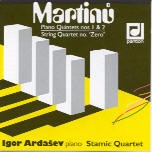This enterprising CD contains two premiere recordings: the First Piano Quintet (1933), and the String Quartet in E-flat (here called No. “Zero”) of 1917. Along with the later and better known Second Piano Quintet, it thus offers a perfect overview of Martinu’s stylistic development, from his earliest days in Prague right up to his American period in the 1940s. One of the great fallacies regarding a composer’s development is the idea that only his most mature, individual pieces have value. In reality, there’s often equal fascination listening to those works derivative of or influenced by other composers, and this is particularly true of the String Quartet recorded here. Although it required some serious editorial work to bring it to performance, the piece clearly shows Martinu writing in a confidently late-Romantic idiom derived from Dvorák, with perhaps a touch of French influence á la Franck. The First Piano Quintet, in contrast, comes from 1933, the height of the composer’s French period, and it’s full of those busy, neo-Baroque textures and astringent harmonies reflecting Martinu’s encounters with Albert Roussel, jazz, and the music of Les Six. By contrast, the Second Piano Quintet shares its idiom with the contemporary symphonies, being composed of long, singing, syncopated melodic lines–a true synthesis of the composer’s previous influences. All three works are splendidly performed and well recorded, making this release a must for fans of the composer and chamber music enthusiasts alike.
































